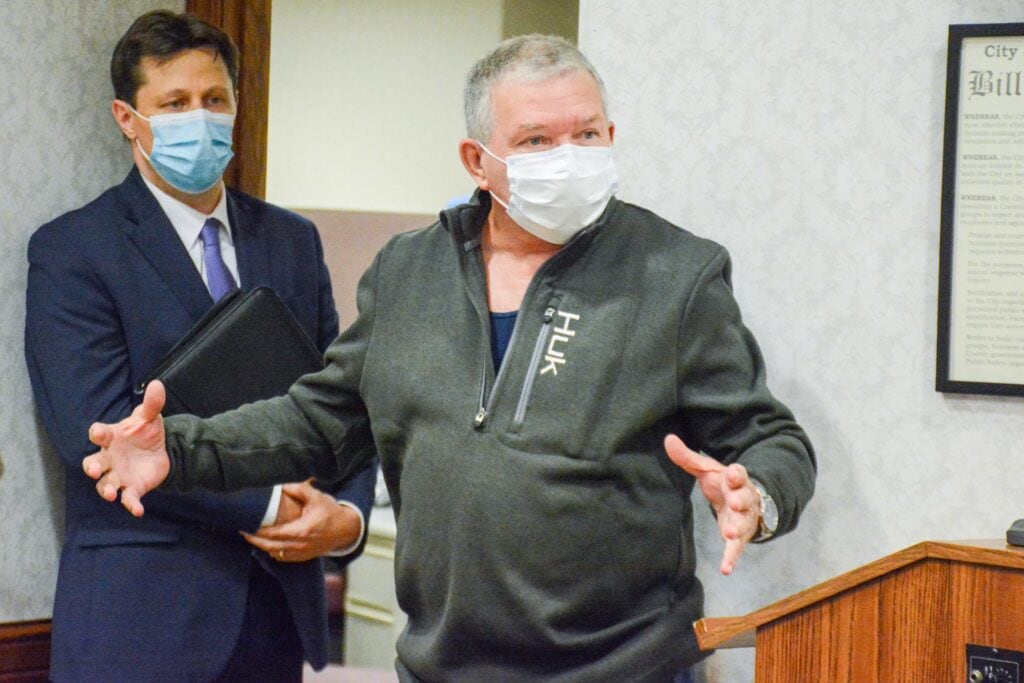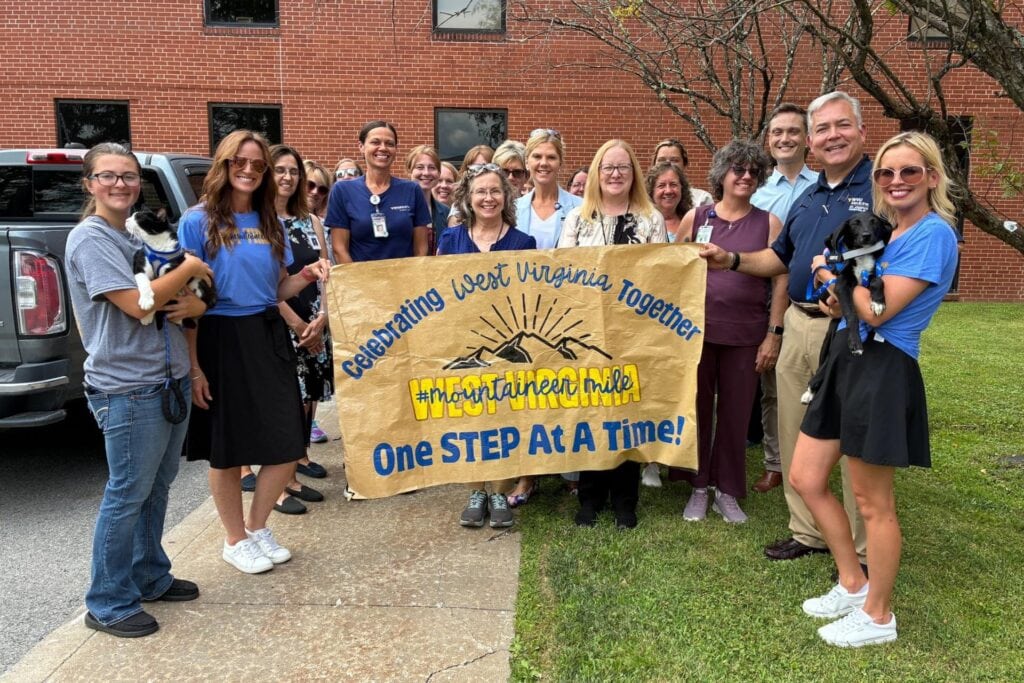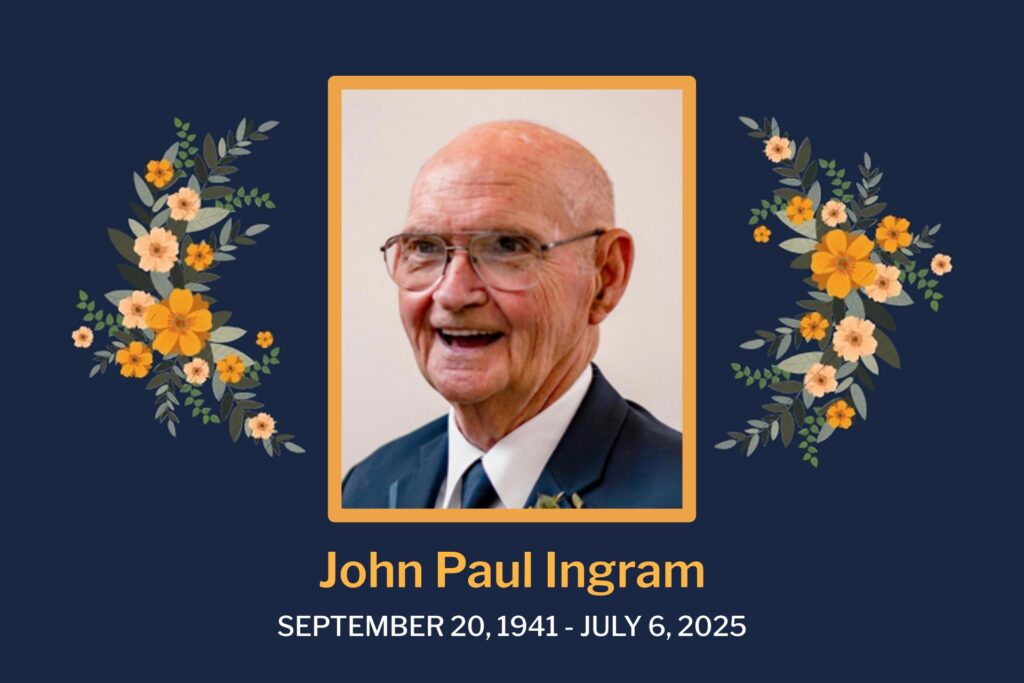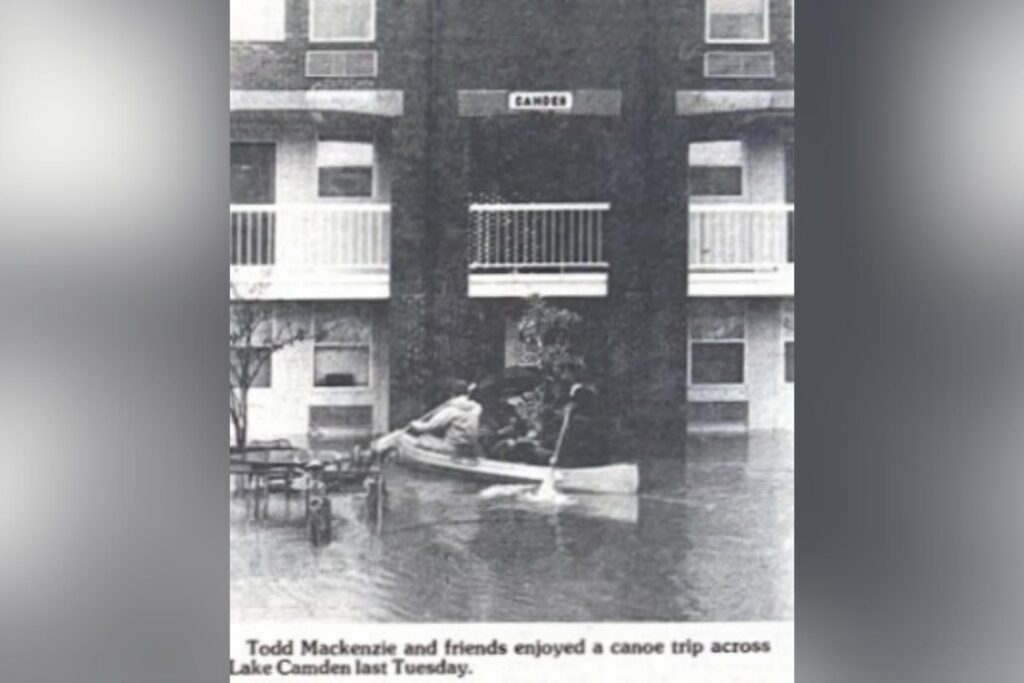BUCKHANNON – Traffic congestion, light pollution and lower property values emerged as some of the many concerns of more than a dozen city residents who came to Thursday’s Buckhannon City Council meeting to voice opposition to a petition to rezone a vacant residential lot on South Kanawha Street.
The lot, owned by Dr. Burton Abel, is located adjacent to the North Central Episcopal Church, between Boggess Street and West Lincoln Street. Abel submitted a petition to city council requesting that the lot be rezoned from a general residential district to a commercial district. The change would allow BC Bank to relocate from Northridge Plaza to the 67 S. Kanawha Street plot, where it would construct a drive-thru.

City attorney Tom O’Neill outlined the process for rezoning a property, saying according to the city law, council must forward the petition to the Planning Commission, which will then hold a meeting and schedule a public hearing.
“Once the petition is considered, the Planning Commission will make a decision whether to recommend or not recommend that the change occur back to the city council, and then if it is recommended, a three-reading ordinance must happen that would enact the change,” O’Neill said.
O’Neill said although state law doesn’t mandate the city host a second public hearing, council “customarily” schedules a second public hearing prior to the third and final reading of the ordinance, and all affected property owners in the vicinity of the property in question are supposed to be notified.
Abel said that when he purchased the property, he’d been informed “that the city was progressive” and to rezone the plot “wouldn’t be a big deal.”
“Apparently, that’s not necessarily true,” he said.
Abel pointed out that several nearby lots that were formerly residential had been rezoned commercial.
“That area is a checkerboard,” Abel said. “From my lot, you can get blinded by the lights from the Crites Electric sign. You can smell the burgers at McDonald’s, and you can see AutoZone.”
Abel said that while the current R-2 residential zone would allow some types of businesses on the property, a bank is not permitted.

“The R-2 designation is a little sketchy regarding the breadth of things that can go there [and it includes] professional office buildings, barber shops, and yes, frat houses,” Abel said. “You could put a day care center there, you could put a nursing home there … you could put a flower shop or a gift shop there, but you can’t put a bank there.”
Abel said no rendering of the proposed BC Bank building had been finalized and that he had been assured by several realtors that neighbors’ property values “would absolutely, positively not be negatively affected.”
“Nobody’s building anything to take away from the ‘quote-unquote charm’ of Buckhannon,” Abel said. “There hasn’t even been a rendering done. It’s being painted as a six-story cinderblock square with spotlights. I think we all have the same goals, and I think we could make it all work … I guess the city has to decide how progressive it really is and if we really want to make things better for the community. That lot won’t stay vacant forever, so something will go up there eventually that may not be as attractive as a bank.”
Many people who own homes in the area, however, objected to the proposal to rezone the residential lot.
William Wilson, a West Lincoln Street resident, told council he would never have purchased his home a year-and-a-half ago if he’d known the nearby property might be rezoned commercial.
“Had I known this – I just purchased my house a year-and-a-half ago when I retired and moved into Buckhannon – I would have never bought it,” Wilson said. “I bought it for the beauty of the place. The West Lincoln area has always been an incredible place, and so has Boggess Street. When I asked a realtor, I was told all of that area was strictly residential, so I’m just dumbstruck, seriously. You’re talking about a beautiful part of town.”
Joyce Ann Law, who lives at 69 S. Kanawha Street, directly beside the lot in question, said she was upset about the proposed rezoning.
“We spent years and years of our life working on our home and trying to get it all right,” she said. “The value of our property – no one’s going to want to buy it for residential [purposes] if there’s a commercial entity right beside it, so consider that and think about that, and keep us in your prayers.”
Councilwoman Pam Bucklew and councilwoman Mary Albaugh, both Boggess Street residents, said they were sympathetic to the concerns. Both worried that a bank drive-thru location would create an even more dangerous situation for vehicles attempting to turn on and off Route 20/Kanawha Street.
“Once you lose the charm of these homes, it will never come back,” Bucklew said, “and you cannot replace the type of homes that we’ve had in the past that are still standing and are being taken care of. People put their heart and soul in them to keep them looking nice.”
Planning Commission past president Curtis Wilkerson, who lives across the street from the property, referenced the Buckhannon 2025 Plan, which involved surveying residents about how they’d like to see the city look and feel in the future.
“We surveyed more than 700 people, and some of the things they talked about was there was a shortage of housing and there was far too much traffic,” Wilkerson said. “The one thing that they did not bring up in the entire plan – and I went through it earlier today – is that there was a lack of bank drive-thrus.”
Wilkerson explained the rationale behind zoning.
“The reason that we have zoning is because there’s a concept of pulling together communities with certain types of architecture and purpose, and we have residential districts dedicated to that and commercial districts dedicated to that,” he said. “The [issue with] turning a residential piece of property into a commercial piece of property is that it takes away the home values of the other residents around it. In effect, it steals value from those property owners to the profit of the person selling it.”
Jane Godwin, a former member of the Historic Landmarks Commission, grew up on Boggess Street and said her mother still has a home there. The property in question is within the Buckhannon Central Residential Historic District, she noted.
“[The Historic Landmarks Commission] has great visions for what Buckhannon can be, but the fact is, we’ve had new businesses being built that totally ignored what the committee recommended,” she said. “I hope the bank can find some other property — because there are other properties — and I hope when the Abels decide to sell that property they can find something that will enhance our town and not be something that is going to be a bone of contention for all the people who live in that area.”

Dr. Tim Reese, who wrote in via email, said it’s imperative city officials consider the long-term consequences of a commercial rezoning – specifically, that once designated commercial, a gas station, automobile repair shop and garage, “wholesale establishments and warehouses, etc.” could be built on the lot.
Abel said he didn’t want to drive a wedge in the community.
“I didn’t come here to fight with my neighbors – really and truly that is not what I wanted,” he said. “This is not how I expected the process to work.”
Council referred the rezoning petition to the city’s Planning Commission as it is required to do by city ordinances. City recorder Randy Sanders made a motion to refer the petition to the Planning Commission, which was seconded by Bucklew and passed unanimously.














